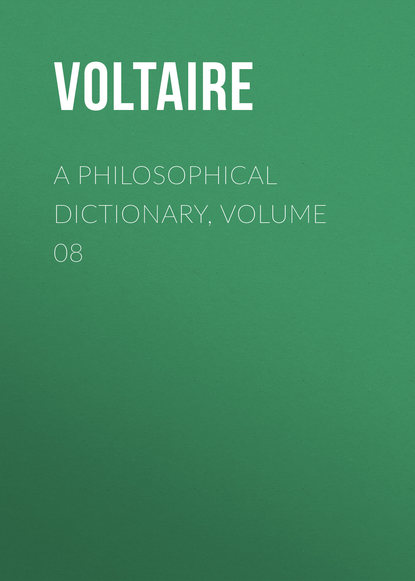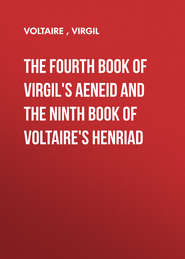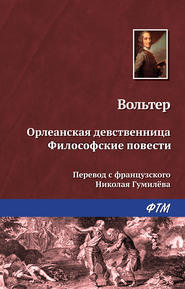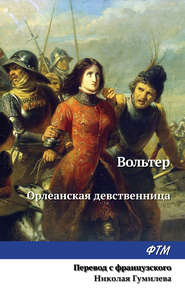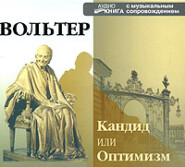По всем вопросам обращайтесь на: info@litportal.ru
(©) 2003-2024.
✖
A Philosophical Dictionary, Volume 08
Настройки чтения
Размер шрифта
Высота строк
Поля
The pope, the successor of Peter, has sometimes gained and sometimes lost; but there are still about fifty millions of persons in the world submitting in many points to his laws, besides his own immediate subjects.
To obtain a master three or four hundred leagues from home; to suspend your own opinion and wait for what he puts forth as his; not to dare to give a final decision on a cause relating to certain of our fellow-citizens, but through commissioners appointed by this stranger; not to dare to take possession of certain fields and vineyards granted by our own sovereign, without paying a considerable sum to this foreign master; to violate the laws of our country, which prohibit a man's marriage with his niece, and marry her legitimately by giving this foreign master a sum still more considerable than the former one; not to dare to cultivate one's field on the day this stranger is inclined to celebrate the memory of some unknown person whom he has chosen to introduce into heaven by his own sole authority; such are a part only of the conveniences and comforts of admitting the jurisdiction of a pope; such, if we may believe Marsais, are the liberties of the Gallican Church.
There are some other nations that carry their submission further. We have, in our own time, actually known a sovereign request permission of the pope to try in his own courts certain monks accused of parricide, and able neither to obtain this permission nor to venture on such trial without it!
It is well known that, formerly, the power of the popes extended further. They were far above the gods of antiquity; for the latter were merely supposed to dispose of empires, but the popes disposed of them in fact. Sturbinus says, that we may pardon those who entertain doubts of the divinity and infallibility of the pope, when we reflect: that forty schisms have profaned the chair of St. Peter, twenty-seven of which have been marked by blood; that Stephen VII., the son of a priest, disinterred the corpse of Formosus, his predecessor, and had the head of it cut off; that Sergius III., convicted of assassinations, had a son by Marozia, who inherited the popedom; that John X., the paramour of Theodora, was strangled in her bed; that John XI., son of Sergius III., was known only by his gross intemperance; that John XII. was assassinated in the apartments of his mistress; that Benedict IX. both bought and sold the pontificate; that Gregory VII. was the author of five hundred years of civil war, carried on by his successors; that, finally, among so many ambitious, sanguinary, and debauched popes, there was an Alexander VI., whose name is pronounced with the same horror as those of Nero and Caligula.
It is, we are told, a proof of the divinity of their character, that it has subsisted in connection with so many crimes; but according to this, if the caliphs had displayed still more atrocious and abominable conduct, they would have been still more divine. This argument, inferring their divinity from their wickedness, is urged by Dermius. He has been properly answered; but the best reply is to be found in the mitigated authority which the bishops of Rome at present exercise with discretion; in the long possession which the emperors permit them to enjoy, because in fact they are unable to deprive them of it; and in the system of the balance of power, which is watched with jealousy by every court in Europe.
It has been contended, and very lately, that there are only two nations which could invade Italy and crush Rome. These are the Turks and Russians; but they are necessarily enemies; and, besides, I cannot distinctly anticipate misfortunes so distant.
Je ne sais point prévoir les malheurs de si loin.
– RACINE, Andromache, act. i, scene 2.
PETER THE GREAT AND J.J. ROUSSEAU
"The Czar Peter … had not true genius – that which creates and makes all of nothing. Some things which he did were good; the greater part were misplaced. He saw that his people were barbarous; he has not seen that they were not prepared for polishing; he would civilize them when they only wanted training. He wished at once to make Germans and English when he should have commenced by making Russians. He prevented his subjects from becoming what they might be, by persuading them that they were what they are not. It is thus that a French preceptor forms his pupil to shine for a moment in his childhood, and never afterwards to be anything. The empire of Russia would subjugate Europe, and will be subjugated itself. The Tartars, its subjects or neighbors, will become its masters and ours. This revolution appears to me unavoidable: all the kings of Europe labor together to accelerate it." (Contrat Social, livre ii. chap. viii.) These words are extracted from a pamphlet entitled the "Contrat Social," or "unsocial," of the very unsociable Jean Jacques Rousseau. It is not astonishing, that having performed miracles at Venice he should prophesy on Moscow; but as he well knows that the good time of miracles and prophecies has passed away, he ought to believe, that his prediction against Russia is not so infallible as it appeared to him in his first fit of divination. It is pleasant to announce the fall of great empires; it consoles us for our littleness. It will be a fine gain for philosophy, when we shall constantly behold the Nogais Tartars – who can, I believe, bring twelve thousand men into the field – coming to subjugate Russia, Germany, Italy, and France. But I flatter myself, that the Emperor of China will not suffer it; he has already acceded to perpetual peace, and as he has no more Jesuits about him, he will not trouble Europe. Jean Jacques, who possesses, as he himself believes, true genius, finds that Peter the Great had it not.
A Russian lord, a man of much wit, who sometimes amuses himself with reading pamphlets, while reading this, remembered some lines of Molière, implying, that three miserable authors took it into their heads, that it was only necessary to be printed and bound in calf, to become important personages and dispose of empires:
Il semble à trois gredins, dans leur petit cerveau,
Que pour être imprimés et reliés en veau,
Les voilà dans l'état d'importantes personnes,
Qu'avec leur plume ils font le destin des couronnes.
The Russians, says Jean Jacques, were never polished. I have seen some at least very polite, and who had just, delicate, agreeable, cultivated, and even logical minds, which Jean Jacques will find very extraordinary. As he is very gallant, he will not fail to say, that they are formed at the court of the empress of Russia, that her example has influenced them: but that prevents not the correctness of his prophecy – that this empire will soon be destroyed.
This good little man assures us, in one of his modest works, that a statue should be erected to him. It will not probably be either at Moscow or St. Petersburg, that anyone will trouble himself to sculpture Jean Jacques.
I wish, in general, that when people judge of nations from their garrets, they would be more honest and circumspect. Every poor devil can say what he pleases of the Romans, Athenians, and ancient Persians. He can deceive himself with impunity on the tribunes, comitia, and dictatorships. He can govern in idea two or three thousand leagues of country, whilst he is incapable of governing his servant girl. In a romance, he can receive "an acrid kiss" from his Julia, and advise a prince to espouse the daughter of a hangman. These are follies without consequence – there are others which may have disastrous effects.
Court fools were very discreet; they insulted the weak alone by their buffooneries, and respected the powerful: country fools are at present more bold. It will be answered, that Diogenes and Aretin were tolerated. Granted; but a fly one day seeing a swallow wing away with a spider's web, would do the same thing, and was taken.
SECTION II
May we not say of these legislators who govern the universe at two sous the sheet, and who from their garrets give orders to all kings, what Homer said to Calchas?:
Os ede ta conta, taere essomena, pro theonta.
He knew the past, present, and future.
It is a pity that the author of the little paragraph which we are going to quote, knew nothing of the three times of which Homer speaks. "Peter the Great," says he, "had not the genius which makes all of nothing." Truly, Jean Jacques, I can easily believe it; for it is said that God alone has this prerogative. "He has not seen that his people were not prepared for polishing."
In this case, it was admirable of the czar to prepare them. It appears to me, that it is Jean Jacques who had not seen that he must make use of the Germans and English to form Russians.
"He has prevented his subjects from ever becoming what they might be," etc. Yet these same Russians have become the conquerors of the Turks and Tartars, the conquerors and legislators of the Crimea, and twenty different nations. Their sovereign has given laws to nations of which even the names were unknown in Europe.
As to the prophecy of Jean Jacques, he may have exalted his soul sufficiently to read the future. He has all the requisites of a prophet; but as to the past and the present, it must be confessed that he knows nothing about them. I doubt whether antiquity has anything comparable to the boldness of sending four squadrons from the extremity of the Baltic into the seas of Greece – of reigning at once over the Ægean and the Euxine Seas – of carrying terror into Colchis, and to the Dardanelles – of subjugating Taurida, and forcing the vizier Azem to fly from the shores of the Danube to the gates of Adrianople.
If Jean Jacques considers so many great actions which astonished the attentive world as nothing, he must at least confess, that there was some generosity in one Count Orloff, who having taken a vessel which contained all the family and treasures of a pasha, sent him back both his family and treasures. If the Russians were not prepared for polishing in the time of Peter the Great, let us agree that they are now prepared for greatness of soul; and that Jean Jacques is not quite prepared for truth and reasoning. With regard to the future, we shall know it when we have Ezekiels, Isaiahs, Habakkuks, and Micahs; but their time has passed away; and if we dare say so much, it is to be feared that it will never return.
I confess that these lies, printed in relation to present times, always astonish me. If these liberties are allowed in an age in which a thousand volumes, a thousand newspapers and journals, are constantly correcting each other, what faith can we have in those histories of ancient times, which collected all vague rumors without consulting any archives, which put into writing all that they had heard told by their grandmothers in their childhood, very sure that no critic would discover their errors?
We had for a long time nine muses: wholesome criticism is the tenth, which has appeared very lately. She existed not in the time of Cecrops, of the first Bacchus, or of Sanchoniathon, Thaut, Bramah, etc. People then wrote all they liked with impunity. At present we must be a little more careful.
PHILOSOPHER
SECTION I
Philosopher, "lover of wisdom," that is, "of truth." All philosophers have possessed this two-fold character; there is not one among those of antiquity who did not give examples of virtue to mankind, and lessons of moral truth. They might be mistaken, and undoubtedly were so, on subjects of natural philosophy; but that is of comparatively so little importance to the conduct of life, that philosophers had then no need of it. Ages were required to discover a part of the laws of nature. A single day is sufficient to enable a sage to become acquainted with the duties of man.
The philosopher is no enthusiast; he does not set himself up for a prophet; he does not represent himself as inspired by the gods. I shall not therefore place in the rank of philosophers the ancient Zoroaster, or Hermes, or Orpheus, or any of those legislators in whom the countries of Chaldæa, Persia, Syria, Egypt, and Greece made their boast. Those who called themselves the sons of gods were the fathers of imposture; and if they employed falsehood to inculcate truths, they were unworthy of inculcating them; they were not philosophers; they were at best only prudent liars.
By what fatality, disgraceful perhaps to the nations of the West, has it happened that we are obliged to travel to the extremity of the East, in order to find a sage of simple manners and character, without arrogance and without imposture, who taught men how to live happy six hundred years before our era, at a period when the whole of the North was ignorant of the use of letters, and when the Greeks had scarcely begun to distinguish themselves by wisdom? That sage is Confucius, who deemed too highly of his character as a legislator for mankind, to stoop to deceive them. What finer rule of conduct has ever been given since his time, throughout the earth?
"Rule a state as you rule a family; a man cannot govern his family well without giving a good example; virtue should be common to the laborer and the monarch; be active in preventing crimes, that you may lessen the trouble of punishing them.
"Under the good kings Yao and Xu, the Chinese were good; under the bad kings Kie and Chu, they were wicked.
"Do to another as to thyself; love mankind in general, but cherish those who are good; forget injuries, but never benefits."
I have seen men incapable of the sciences, but never any incapable of virtue. Let us acknowledge that no legislator ever announced to the world more useful truths.
A multitude of Greek philosophers taught afterwards a morality equally pure. Had they distinguished themselves only by their vain systems of natural philosophy, their names would be mentioned at the present day only in derision. If they are still respected, it is because they were just, and because they taught mankind to be so.
It is impossible to read certain passages of Plato, and particularly the admirable exordium of the laws of Zaleucus, without experiencing an ardent love of honorable and generous actions. The Romans have their Cicero who alone is perhaps more valuable than all the philosophers of Greece. After him come men more respectable still, but whom we may almost despair of imitating; these are Epictetus in slavery, and the Antonines and Julian upon a throne.
Where is the citizen to be found among us who would deprive himself, like Julian, Antoninus, and Marcus Aurelius, of all the refined accommodations of our delicate and luxurious modes of living? Who would, like them, sleep on the bare ground? Who would restrict himself to their frugal habits? Who would, like them, march bareheaded and barefooted at the head of the armies, exposed sometimes to the burning sun, and at other times to the freezing blast? Who would, like them, keep perfect mastery of all his passions? We have among us devotees, but where are the sages? where are the souls just and tolerant, serene and undaunted?
There have been some philosophers of the closet in France; and all of them, with the exception of Montaigne, have been persecuted. It seems to me the last degree of malignity that our nature can exhibit, to attempt to oppress those who devote their best endeavors to correct and improve it.
I can easily conceive of the fanatics of one sect slaughtering those of another sect; that the Franciscans should hate the Dominicans, and that a bad artist should cabal and intrigue for the destruction of an artist that surpasses him; but that the sage Charron should have been menaced with the loss of life; that the learned and noble-minded Ramus should have been actually assassinated; that Descartes should have been obliged to withdraw to Holland in order to escape the rage of ignorance; that Gassendi should have been often compelled to retire to Digne, far distant from the calumnies of Paris, are events that load a nation with eternal opprobrium.
One of the philosophers who were most persecuted, was the immortal Bayle, the honor of human nature. I shall be told that the name of Jurieu, his slanderer and persecutor, is become execrable; I acknowledge that it is so; that of the Jesuit Letellier is become so likewise; but is it the less true that the great men whom he oppressed ended their days in exile and penury?
One of the pretexts made use of for reducing Bayle to poverty, was his article on David, in his valuable dictionary. He was reproached with not praising actions which were in themselves unjust, sanguinary, atrocious, contrary to good faith, or grossly offensive to decency.
Bayle certainly has not praised David for having, according to the Hebrew historian, collected six hundred vagabonds overwhelmed with debts and crimes; for having pillaged his countrymen at the head of these banditti; for having resolved to destroy Nabal and his whole family, because he refused paying contributions to him; for having hired out his services to King Achish, the enemy of his country; for having afterwards betrayed Achish, notwithstanding his kindness to him; for having sacked the villages in alliance with that king; for having massacred in these villages every human being, including even infants at the breast, that no one might be found on a future day to give testimony of his depredations, as if an infant could have possibly disclosed his villainy; for having destroyed all the inhabitants of some other villages under saws, and harrows, and axes, and in brick-kilns; for having wrested the throne from Ishbosheth, the son of Saul, by an act of perfidy; for having despoiled of his property and afterwards put to death Mephibosheth, the grandson of Saul, and son of his own peculiar friend and generous protector, Jonathan; or for having delivered up to the Gibeonites two other sons of Saul, and five of his grandsons who perished by the gallows.
I do not notice the extreme incontinence of David, his numerous concubines, his adultery with Bathsheba, or his murder of Uriah.
What then! is it possible that the enemies of Bayle should have expected or wished him to eulogize all these cruelties and crimes? Ought he to have said: Go, ye princes of the earth, and imitate the man after God's own heart; massacre without pity the allies of your benefactor; destroy or deliver over to destruction the whole family of your king; appropriate to your own pleasures all the women, while you are pouring out the blood of the men; and you will thus exhibit models of human virtue, especially if, in addition to all the rest, you do but compose a book of psalms?
Was not Bayle perfectly correct in his observation, that if David was the man after God's own heart, it must have been by his penitence, and not by his crimes? Did not Bayle perform a service to the human race when he said, that God, who undoubtedly dictated the Jewish history, has not consecrated all the crimes recorded in that history?
However, Bayle was in fact persecuted, and by whom? By the very men who had been elsewhere persecuted themselves; by refugees who in their own country would have been delivered over to the flames; and these refugees were opposed by other refugees called Jansenists, who had been driven from their own country by the Jesuits; who have at length been themselves driven from it in their turn.
Thus all the persecutors declare against each other mortal war, while the philosopher, oppressed by them all, contents himself with pitying them.





